Advertisement
Marciano Vs. Ali And The Story Of 'The Super Fight'
Resume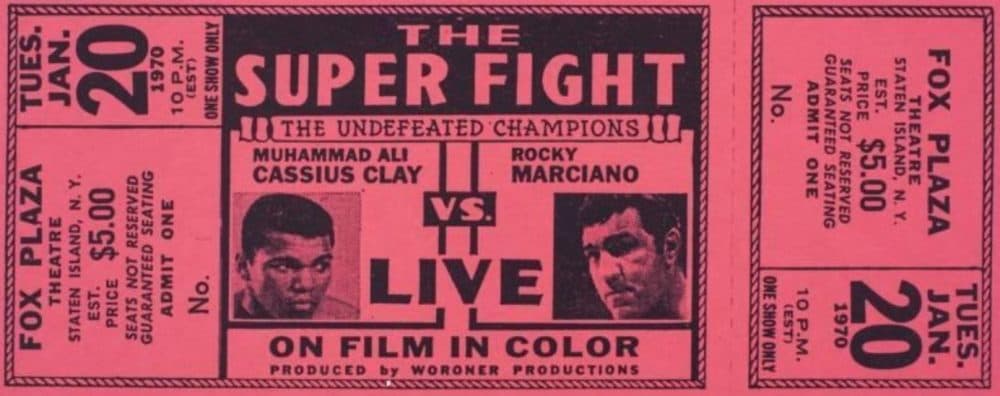
It’s 1967. Smokey Robinson & the Miracles, The Supremes and the Beatles were on the radio. But tune in at the right time, and you could also hear "The Super Fight."
"That was the brainchild of this pudgy disc jockey and promoter named Murray Woroner," author Mike Stanton says.
"He got 250 boxing writers, and he gave them a questionnaire and had them answer all of these characteristics to rate the greatest fighters."
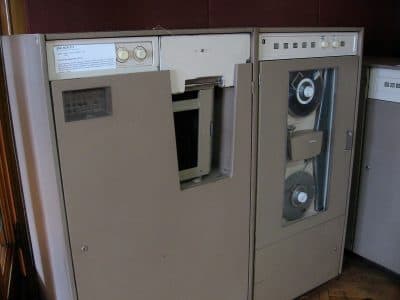
From the data he collected, Woroner developed a list of 16 of history’s greatest heavyweights. Then he wrote a radio script of simulated fights, including sound effects, that had the fighters battling through an elimination tournament to determine the greatest of them all. To ensure that the judging would be completely indisputable, Woroner fed the opinions of the writers into a computer: the formidable NCR 315.
"The public loved it," Stanton says. "It had a huge audience. It was a huge success. And, even though computer algorithms try to take the emotion out of these barroom debates, you had angry letters from fans about their fighter losing. You had accusations that the computer took a dive."
Yeah, because … boxing. But there were no angry letters from the fans of the winner, Rocky Marciano, who had retired as the undefeated heavyweight champion in 1956.
"Rocky was amused," Stanton says. "And he actually was given a $10,000 jeweled belt, as this mythic champion of all time."
A more recent heavyweight champ was not similarly amused.
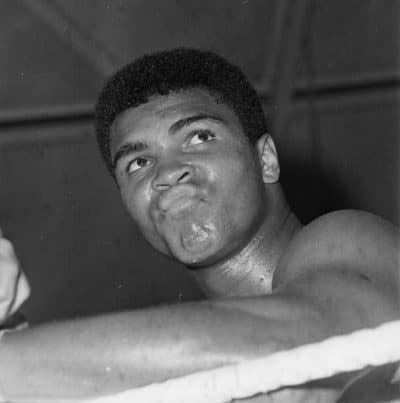
"Muhammad Ali was knocked out in the second round of this tournament by Jim Jeffries," Stanton says. "And this is a rough time for Ali. He was suspended from boxing after refusing the draft to fight in Vietnam. Couldn’t fight, needed money. And he sued Murray Woroner for a million dollars, saying, 'You have impugned my reputation by saying I would lose to Jim Jeffries, when I am the greatest.' So Woroner very shrewdly settled the suit for one dollar, and Muhammad Ali’s agreement to do a filmed computer fight against Rocky Marciano."
A cinematic pseudo-fight, actually. And Woroner was certain a gullible public would eat it up.
On The Set
"So they go into this studio," Stanton says. "And they film 70 one-minute rounds in a variety of scenarios. And sometimes the two men would get carried away and forget that this was only make believe.
"They filmed for three days in a Miami studio, with blacked-out windows and tight security. And, in fact, they filmed the final scenes just days after a federal court judge had ordered Ali to go to prison.
"They seemed like polar opposites: the white conformist from the 1950s and the black rebel from the 1960s. But there was this mutual respect. When Rocky was coming up, young Cassius Clay would listen to that transistor radio, carrying the fight from faraway Madison Square Garden. And he’d hear, 'Heavyweight Champion of the World.' And he wanted to be Rocky."
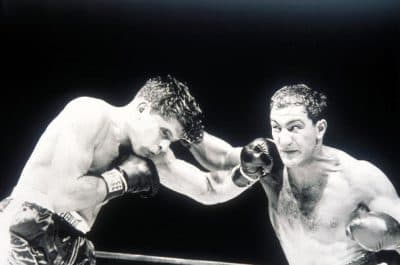
It was easy to understand why the deal appealed to Ali. He needed the money. But Rocky Marciano probably didn’t.
"He hoarded cash," Stanton says. "He didn’t take checks. And he was very eccentric. He would hide cash in toilet bowls and curtain rods."
Rocky was also said to have stashed suitcases full of cash in a friend’s bomb shelter. But, apparently, he relished the challenge to get back in shape. And he had finished his career 49–0. Why wouldn’t he have figured that — despite Ali’s ridiculous advantage in weight, height and reach — he could extend his undefeated record? So pride was a factor.
That became apparent when the director Woroner wanted the fighters to stage knockdowns.
"Rocky had only been knocked down twice in his career, and he was embarrassed both times — even though that’s part of the game," Stanton says. "And Ali had never been knocked down. And finally, Rocky agreed to go down. And Ali threw a punch. Hit him. Rocky went down. Ali yelled, 'Drop the wop!' And Rocky rolled over, took his mouthpiece out and started laughing hysterically."
Sounds as if it might have been kind of fun. Sometimes. Not always. Both guys were, after all, boxers. And at 46, Rocky could still hit. At one point he nailed Ali in the breadbox.
"And Ali just kind of exhales," Stanton says. "He goes, 'Oooofff.' And he sat down on his stool. And he refused to get up and resume filming until Murray Woroner sent an aide to the bank to get $2,000 in cash and bring it back and give it to Ali to continue."
A Friendship Develops
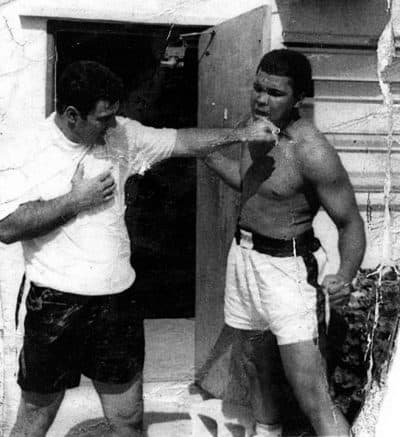
As the two men labored to bring Murray Woroner’s goofy script to the screen, a strange thing began to happen … strange and potentially wonderful.
"The two of them got to talking one day during a break in the filming," Stanton says. "And they sat together by the side of the ring. And they had a bag of grapefruits. And Ali was peeling the grapefruits and ripping off sections and passing some over to Rocky. They started to talk about the racial strife in America.
"And Rocky started talking about, 'What if we did a bus tour, and we went around to the inner-city neighborhoods across America?' And Ali got enthusiastic and said, 'Imagine Muhammad Ali and Rocky Marciano going into the worst areas. Watts, all these other places. And say, “Hey, guys, come on. We can get along.” ' And Ali got very animated, and he said, 'We could shake up the world, me and you. Would you do it? Would you do it? Would you do it?' And Rocky said, ‘Yeah. I’ll do it.’ "
Ali and Marciano didn’t know which of them would be declared the winner by Murray Woroner’s NCR 315. They only knew that they’d found they had something in common that was more important than this project: the conviction that together they could make a difference in a realm much larger and more significant than the boxing ring or the box office.
And they’d begun to care about each other.
"Ali’s wife at the time pulled Rocky aside," Stanton says. "And she said — worried for Muhammad’s long-term health, prophetically so — ‘Do you think I can get him to walk away from the ring before it’s too late?’ "
Rocky, who’d apparently stepped away from boxing in pretty good shape, didn’t think Ali would be able to do the same. He said the champ’s ego was so big that somebody would have to knock him out of the ring to make him stop fighting.
The Death of Rocky
As it turned out, prosecutors determined to end Ali’s career were foiled in that attempt by the Supreme Court. The champ would return to the ring in the fall of 1970. And the plan to tour the country with Rocky Marciano, promoting racial harmony?
No. Because just a few weeks after the final filming session of "The Super Fight" …
"Rocky Marciano is on the eve of his 46th birthday," Stanton says. "And he was supposed to fly home from an appearance in Chicago. And then he got a last-minute offer to fly to Des Moines, Iowa, to the opening of a steakhouse owned by a nephew of a mob friend of his from Chicago, named Frankie Farrell.
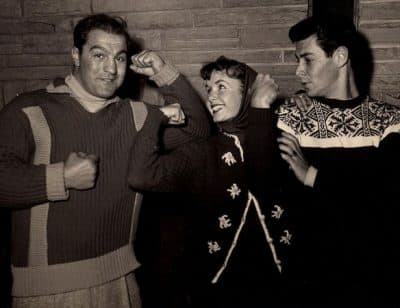
"So, unfortunately, on this day, they had a very inexperienced pilot who wasn’t trained to fly with instruments when visibility was poor. And they were flying into a massive storm system over the Midwest. And they crashed in a cornfield. And he died."
Sports columnist Jim Murray had the perfect epitaph.
"Start the count. He’ll get up. ... A lot of us today are wishing there were an honest referee in a cornfield in Iowa."
But what about the result of Rocky’s last fight? Surely the bloodless computer wouldn’t take into account sudden death by accident. And just as surely, Murray Woroner had on his hands a movie bearing emotional baggage he couldn’t have imagined while he was calling for a left hook, a right cross and so on.
A prize fight in which one of the combatants enjoys a 20-pound advantage over the other is rare. And that’s not the most peculiar aspect of this particular fight.
"Does it feel authentic to you?" I asked Mike Stanton.
"No, it doesn’t," Stanton says. "It’s kinda like watching professional wrestling. You know it’s not real. They know it’s not real. Nobody’s pretending it is real. Ali towers over Rocky. And yet Rocky’s belly is flat and hard, and Ali’s a little pudgy and out of shape. It’s just very surreal."
There was a black curtain around the ring. There were no spectators, just the two ex-champs dancing to Murray Woroner’s script.
"It’s like they’ve been abducted by aliens," Stanton says. "And they’re fighting in some, you know, spaceship."
Release Day
"When the movie was finally released in January of 1970, 600-plus theaters around the country carried it," Stanton says. "People bought tickets and went in. And they had bonded couriers deliver the reels of the film 30 minutes before the 10 p.m. start. And, lo and behold, Rocky knocks him out in the 13th round."
7,000 people watched the film at Boston Garden, close by Rocky’s Brockton, Massachusetts birthplace.
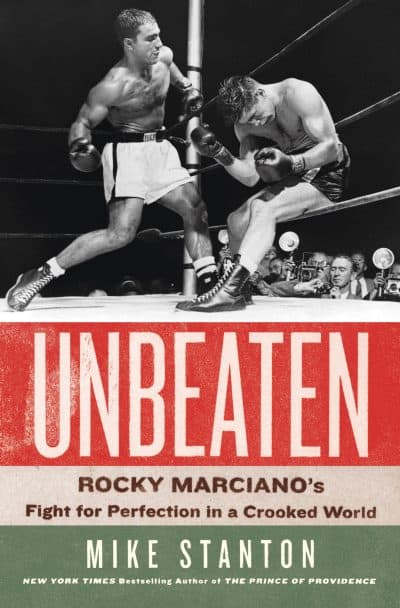
"His father, Pierino, smiled and had tears in his eyes," Stanton says. "The first time he’d smiled since Rocky’s death, they said. And he said, ‘Well, Rocky finally won his 50th fight.’ "
Not many hustles end that poetically. And, in fact, Murray Woroner’s didn’t, either.
"In the European version, Muhammad Ali won," Stanton says.
Maybe that was in Ali’s contract. In any case, Ali went on to box for another decade, creating — in the process — the unforgettably brutal three bouts with Joe Frazier. By the time he died just over two years ago, Muhammad Ali was known less as a boxer than as a global ambassador for peace and brotherhood.
And Murray Woroner? As one more in a long line of promoters certain that the gullibility of the public is considerably deeper than a well and wider than a church door, he did just fine. His movie was a hit.
Mike Stanton’s new book is Unbeaten: Rocky Marciano’s Fight For Perfection in a Crooked World.
This segment aired on July 14, 2018.
